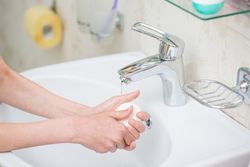5 FAQ About Well Water in Alabama

From washing dishes and clothes to bathing and showering, your home water system is critical for your family’s health and happiness. Public water systems are maintained by the local or state government, but private well water is the homeowner’s responsibility. Use this guide of well maintenance tips to ensure your family’s safety.
5 Home Water System Questions & Answers
What kind of wells does Alabama allow?
Alabama has both individual and commercial wells. Individual wells are located on the property of private residences and are the responsibility of the homeowner to test and maintain. Commercial wells are used by businesses, such as restaurants, hotels, and swimming pools.
Is well water safe?
 Well water is filtered naturally while it’s underground, so it often has a higher mineral content than municipal water. Some property owners install additional filters to remove particles that can give water a strong flavor or cloudy appearance.
Well water is filtered naturally while it’s underground, so it often has a higher mineral content than municipal water. Some property owners install additional filters to remove particles that can give water a strong flavor or cloudy appearance.
Water that has an odor or color despite filtration is not safe to drink or use for showering and washing. However, harmful bacteria may be present in well water that appears clean. To ensure the water’s purity, have it tested regularly.
How do I test well water?
A contractor will disinfect the well after installation, since drilling may result in contamination, but you should continue to test the site regularly. Schedule a bacterial test for your home water system every year and a chemical screening every three years. Call for testing as soon as possible if you experience wellhead flooding, if your tap water is discolored, or if there’s been contamination nearby.
What can contaminate my well water?
Rainwater may contaminate a home water system if it carries fecal bacteria or toxic chemicals into your well. Leakage from underground waste storage tanks and heavy metals from household plumbing may also contaminate the soil and leach into your well water.
What safety measures does the state require?
Alabama law stipulates that all wells must be at least 150 feet away from potential contamination sources, such as a cesspool or barnyard; at least 100 feet away from septic tanks; and at least 75 feet away from underground utility lines. Homeowners who want to install a well need to be located above the 100-year flood plain due to runoff concerns.
The well casing must be at least 4.5 inches in diameter around the outside of the pipe and may be made from steel or non-porous concrete. All wells must also be capped to prevent contamination during construction and usage. If you need to abandon an old well before drilling a new one, all access points must be sealed with cement to prevent contamination.
Trust Branton Bros. Well Drilling, Inc., in Dothan, AL, for repair, replacement, and installation of your home water system. They’ve been in business for over 50 years and are committed to getting the job right the first time. Learn more about their approach to well maintenance and repairs online, or call (334) 677-5489 to request a free estimate.
About the Business
(25 reviews)
Have a question? Ask the experts!
Send your question

